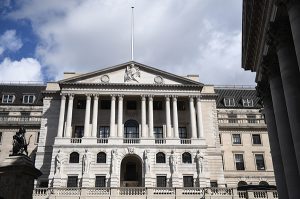Bloomberg
UK Prime Minister Liz Truss’s new government has looked at changing the Bank of England’s (BOE) money-printing program to save the UK taxpayer billions of pounds at a time when the public finances are under increasing strain.
Under the option, interest paid on some deposits held by commercial lenders at the BOE would be scrapped, potentially saving more than £10 billion a year, based on calculations with the benchmark interest rate at 2.5%.
The government has looked at the option and Truss is “aware†of the potential financial benefit, said Gerard Lyons, her external economic adviser. The prime minister has already unveiled a costly energy support package for households and businesses, and her chancellor, Kwasi Kwarteng, is due to outline details of planned tax cuts. The measures, which could cost up to £200 billion, will add to the swollen budget deficit.
The issue of “interest on reserves†has risen up the agenda because the government will soon be making payments to high street banks due to the way the BOE’s quantitative easing mechanism operates.
As part of the £895 billion QE program, an equivalent amount of reserves — deposits held by commercial lenders at the BOE — were created. The central bank pays interest on those, a cost that was initially more than covered by income earned on government bonds bought by the BOE with the money it created.
That equation has changed now that interest rates are rising, prompting the government to consider a revamp.
“It gets more attractive to go down this route the higher interest rates go,†said Lyons, chief economic strategist at
online wealth manager Netwealth. “These are two really savvy people,†he added, referring to Truss and Kwarteng. “But the fact they are aware does not mean they are going to make it policy.â€
Once the BOE’s benchmark interest rate is around 2.25%, the interest paid on reserves will be greater than the income from gilts and, under the QE indemnity with the Treasury, the government will start transferring funds to the BOE.
Those taxpayer funds will in turn be passed to commercial lenders. The transfer is imminent because the BOE is expected to raise rates from 1.75% to at least 2.25% on Thursday. The Treasury declined to comment.
While banks say a change would amount to a stealth tax, any such complaints may not get much traction given the number of benefits in the pipeline for the sector. In addition to a lower corporation tax, Truss’s government plans a program of deregulation and is considering scrapping a cap on banker bonuses.
 The Gulf Time Newspaper One of the finest business newspapers in the UAE brought to you by our professional writers and editors.
The Gulf Time Newspaper One of the finest business newspapers in the UAE brought to you by our professional writers and editors.
